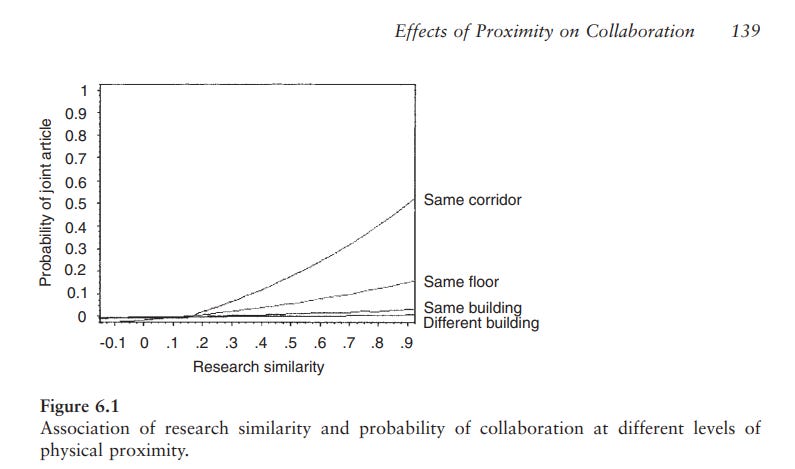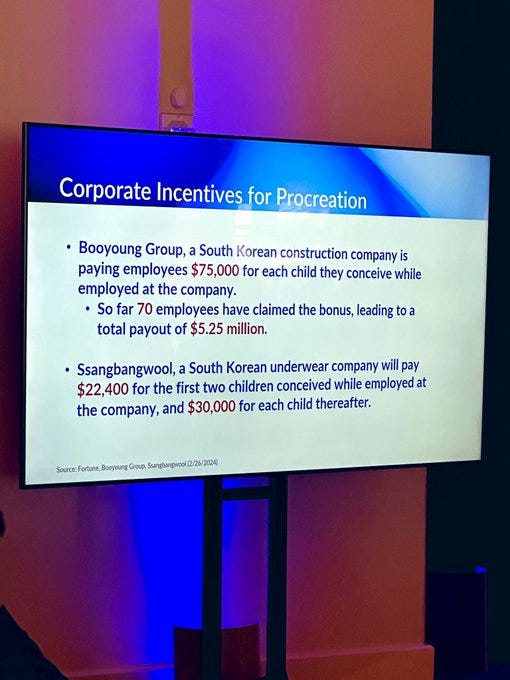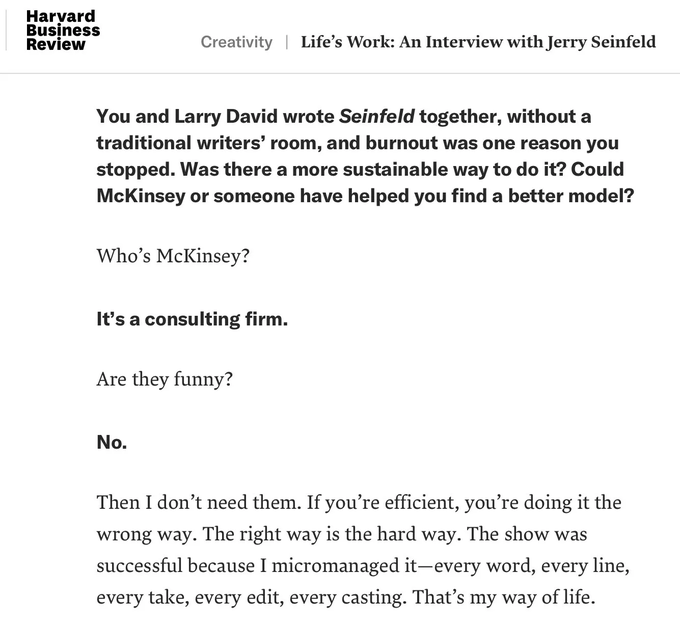Perspective on Risk - June 13, 2024 (Leadership)
This is even more fucked up than I imagined; Premium office space; Feedback; The longer one is engaged in solving a task... ; Incentives; Hiring; Meetings; Consultants;
Haven’t written a Leadership post in a while; some of you seem to like these. Here are some past Leadership posts if you’re interested:
How Totally Screwed Up Are Companies?
A great paper for students of organizational design, and why organizational design projects often fail.
Moving off the Map: How Knowledge of Organizational Operations Empowers and Alienates
I think a lot about this study, when managers doing processes design learned how screwed up their firm was, they gave up trying for leadership roles in existential despair. (Ethan Mollick)
This paper examines how employees become simultaneously empowered and alienated by detailed, holistic knowledge of the actual operations of their organization … As employees build and scrutinize process maps of their organization, they develop a new comprehension of the structure and operation of their organization. What they had perceived as purposively designed, relatively stable, and largely external is revealed to be continuously produced through social interaction.
I trace how this altered comprehension of the organization’s functioning and logic changes employees’ orientation to and place within the organization. Their central roles are revealed as less efficacious than imagined and, in fact, as reproducing the organization's inefficiencies. Alienated from their central operational roles, they voluntarily move to peripheral change roles from which they feel empowered to pursue organization-wide change.
A team member explained, “I’m getting a really clear visual of what the mess is.” Standing back from the wall, he sighed, and said, “The problem is that it was not designed in the first place.”
a team member explained that she had been “assuming that somebody did this on purpose, and it wasn’t done on purpose; it was just a series of random events that somehow came together.
Some held out hope that one or two people at the top knew of these design and operation issues; however, they were often disabused of this optimism. … They learned that what they had previously attributed to the direction and control of centralized, bureaucratic forces was actually the aggregation of the work and decisions of people distributed throughout the organization. Everyone was working on the part of the organization that they were familiar with, assuming that another set of people were attending to the larger picture, coordinating the larger system to achieve goals and keeping the organization operating.
They found out that this was not the case.
The CEO, after being walked through the map, sat down, put his head on the table, and said, “This is even more fucked up than I imagined.” The CEO revealed that not only was the operation of his organization out of his control but that his grasp on it was imaginary.
Here is a layman’s article if you don’t want to read the academic paper: Can You Know Too Much About Your Organization? (HBR)
People Will Come To Premium Office Space
Maybe, Just Maybe, Try Treating Staff As Valuable People
HSBC's New York attendance jumps to 80% at new office (Reuters)
HSBC's (HSBA.L), opens new tab employee attendance has jumped to 80% at its new office in New York's Hudson Yards area, said Michael Roberts, CEO of HSBC in the USA and the Americas, on Thursday.
Attendance was 40% before the pandemic at its former base in Bryant Park
HSBC's new office has open working spaces overlooking the Hudson River. It includes perks like a coffee bar, wellness center, and a combination of private and shared spaces to tempt workers back.
One Reason To Bring Staff Together
Some jobs can be done independently; these can/should be remote. Others require collaboration. If you want collaboration, imitate proximity is a key.
Feedback
Do Physicians Improve More from Positive or Negative Feedback?
Physicians improve more from positive feedback than from negative feedback, with negative feedback even reducing performance for a non-trivial share of situations. Experiments with laypersons replicate these results and show that struggles with negative feedback can be mitigated by giving incentives directly tied to improvement and by adding qualitative information that helps individuals interpret past performance.
How to Get People to Seize Opportunities at Work (HBR)
People don’t always make use of opportunities and programs offered to them. Organizations can find ways to improve the take-up rates of products and programs by utilizing concepts from behavioral economics.
three key barriers to take up:
Learning costs: the time and effort required to gather information on the opportunity, eligibility requirements, relevant processes, and so forth, which include “time taxes”
Compliance costs: administrative and procedural hurdles
Psychological costs: social stigma, loss of autonomy, frustration, and uncertainty
Leaders implement behaviorally informed interventions to counter these costs, attitudes, and biases.
We propose five steps to make take-up strategies an integral part of an organization:
Review your current portfolio of offered opportunities.
Learn about the behaviors and preferences of your target beneficiaries.
Understand and address individual cognitive biases.
Minimize the actual take-up cost.
Monitor take up and collect feedback as you go.
The longer one is engaged in solving a task, the more the mind begins to wander
Upward of 50% of the time toward the end of the task.
Our results confirm that mind-wandering increases in frequency over time during task performance, implicating mind-wandering in characteristic within-task psychological changes, such as increasing boredom and patterns of worsening behavioral performance with time-on-task.
Incentives
CEO bonuses have a small positive predictive effect on next year's ROA but have no effect on either next year's market-to-book value (Tobin's Q) or stock return.
Stock options have no effect on next year's ROA or any market-related metrics.
Too few studies exist to test other time lags or incentive effects on other outcomes. CEO financial incentives have no effect on financial restatement.
CEO financial incentives are unrelated to subsequent financial restatement.
Hiring
Job Seekers Brave AI Bots, Interviewing Nightmares in Tougher Labor Market (Bloomberg)
From puzzling personality tests to group interviews that feel like a reality dating show, hiring rites have taken a surreal turn.
[A] personality test made the rounds online for using a blue avatar named Ash to ask the questions, which observers found both comical and bizarre. Paradox.ai, which created the test, said the assessment is scientifically validated, and the avatar was chosen to be inclusive to all demographics.
To deal with a higher volume of applications, some employers are trying to get through early interviews faster by avoiding real-life conversations altogether. Instead, they’re asking candidates to just record their answers to a series of prompts. In some cases, AI bots first screen videos before they go on to recruiters.
Remember, none of this works. We know what does, structured interviews and Job Knowledge Tests.
Or Maybe We Just Get Them To Play Civ 6
Good gamers, good managers? A proof-of-concept study with Sid Meier’s Civilization
Using the strategy game Civilization, this proof-of-concept study explores if strategy video games are indicative of managerial skills and, if so, of what managerial skills. Under controlled laboratory conditions, we asked forty business students to play the Civilization game and to participate in a series of assessment exercises. We find that students who had high scores in the game had better skills related to problem-solving and organizing and planning than the students who had low scores.
For the record, performance in first-person-shooters like Battlefield, Destiny, and Fortnite don't show the same pattern.
Meetings
Amazon’s Standard Meeting Agenda








